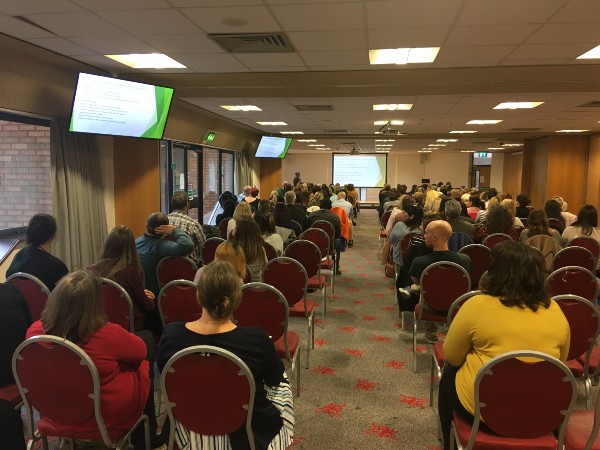“Even before I started working for Cardiff, I felt valued,” says Sabastain, a principal social worker (PSW) and assistant team manager in a children’s services locality team called south 4. “It was noticeable in the way that the service engaged with me even before I had completed my job application form. I could see that they identified my potential just by looking at my CV and they made an effort to get me on board. That counted for quite a lot.”
Once Sabastain was selected for his role, he was given more than two weeks to prepare for his interview. And when he got the job and had to relocate from South Africa with his family, the council offered to pay for his family’s quarantine stay.
“That showed that they cared about my mental health and my family’s during the lockdown and valued me as a person,” he says.

Sabastain, PSW at Cardiff Council
Supportive environment
Providing a supportive environment for staff is a cornerstone of how Cardiff Council delivers children’s services. The council has a buddy and mentor system to support new recruits. Buddies are normally peers who help new staff settle in, while mentors are more experienced colleagues who provide practice support.
“My buddy showed me around the workplace, while my mentor gave me directions on my cases – such as if they needed to be escalated to the child protection register or go through the court processes,” says Sabastain. “At every stage of this journey, she was very helpful. On top of that, my manager understood that, as I was coming from South Africa, some processes would be different for me, but she was willing to guide me through these differences and that was invaluable.”
Sabastain’s welcome to Cardiff was echoed by another relatively recent recruit to the service. Despite joining the team during the height of the Covid-19 pandemic, Helen did not feel that she missed out on one-to-one support.
“I never felt like I couldn’t admit to feeling out of my depth,” says Helen, who qualified in 2020 and credits her manager for her “outstanding” support.

Photo: Fotolia/3D_Generator
“She helped to challenge and support me in how I progress casework,” Helen says. “I remember when I first qualified, I got involved in quite a complicated case, during the height of the pandemic, and one of the principal people working with the family was off sick.
“The challenge was that there were several children in different placements, but I was well supported by my co-workers, and I ended up taking the lead with this family. Their mother was not well, and it was all terribly traumatic for all involved because the children had been removed from their family. Despite the complexities, we were able to get them all back home.
“I was able to achieve that, because my team manager gave me the space to concentrate on each child and adult – one at a time – and not feel too worried about how much work was involved.
“The work was very complicated because it involved unpicking family relationships between the children and the extended family. My manager gave me the space to take things slowly and not rush to do everything immediately. She gave me the confidence to do that. It was an amazing learning experience for me.”
Cardiff is very creative in how it meets service demand
Reducing workload
Other ways that Cardiff works to improve the experience for social workers is through service efficiencies. The service has recently rolled out a new recording system designed to cut down the amount of administration social workers have to complete. It has also expanded its locality teams, in a bid to spread the caseload and distribute expertise, with the creation of a fourth division in the south team, where Sabastain works.
“We have a north, east and south team and, within the south team, there are four divisions,” he says. “South 4 was created in June 2021, before I came, to increase capacity in the south of Cardiff, which is one of the most deprived areas of the city. The team was created from scratch to tackle some of these challenges and has a new manager, me as the PSW, and team members [recruited] from other teams. I support five people, including a student.”

Photo by Cardiff
Building expertise
Working in these locality teams is one of the ways that Jodie believes Cardiff is better able to support social workers and the children in their authority.
The locality teams help to build social workers’ expertise and ensure social workers get to know the areas to cover.
“What I like about the locality teams in Cardiff is the way it is better able to meet children’s needs quicker and use expertise within the service,” she says. Jodie joined Cardiff in October 2021 as an agency member of staff, and manages the SAFE team, which covers the safeguarding of adolescents from exploitation across all the localities in the city.
“Cardiff is very creative in how it meets service demand, which I really value, because it tells me that they understand how much the service needs to be flexible enough to respond to the needs of the young people. If there is a crisis and they cannot tackle it one way, they will adapt the support, using the resources they have, and try and meet it another way. I see that in how they recruit social work assistants and get adolescence workers to support social workers to do their job.
“Exploitation can scare a lot of professionals because the risks can be high, but I know that social workers in my team feel very supported when they are dealing with very challenging situations. I believe that this is because Cardiff has adopted a model that contextualises safeguarding, collaborates with agencies such as the police, and uses a strengths-based model that improves our ability to identify and screen young people at risk of exploitation.”

Listening culture
Deborah Driffield, director of Cardiff children services, says: “In Cardiff, we believe in the old quote that ‘if you want people to do a good job – give them a good job to do’. So we have been focussing heavily on the retention and recruitment of social workers over the previous three years.
“We have regular sessions with frontline staff to listen and learn from them. They have told us how we could improve the jobs they do by helping them access more in-depth training for court work, spend less time dealing with bureaucracy and access specialist therapeutic supervision from qualified counsellors – we are on a mission to make that happen.
“We have been successful in increasing our permanent workforce by ensuring that they get support right from the time they apply for a post in Cardiff, and all the way through the recruitment and induction process. We provide a buddy system, mentoring and opportunities to develop expertise in a variety of settings, whether you want to progress into a management role or specialise in an area that interests you.
“We have a stable management team who meet together at the start of every day to ensure we know what is going on and how we can best support our staff to support the families they are working with.
“We collate and share all of the growing number of compliments we receive and try hard to take a strengths-based approach to all that we do – and when we don’t get it quite right we try and show humility and compassion.”
Are you interested in working for Cardiff Council? Find out more or search for jobs.




 Facebook
Facebook X
X LinkedIn
LinkedIn Instagram
Instagram